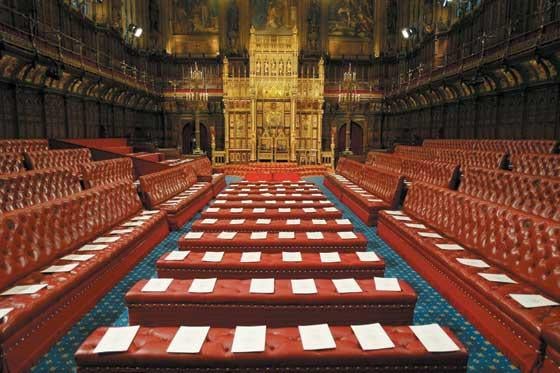
Peers have kept up pressure on the government over press regulation with a move to force news websites to pay their opponents’ legal costs, even if they win in court.
The change proposed to legislation currently going through the House of Lords would have effectively implemented measures contained within Section 40 of the Crime and Courts Act 2013 for digital publishers, as opposed to newspapers.
It would have meant online news sites which were not signed up to an officially recognised regulator footing the legal costs of both sides in libel and privacy actions brought against them.
The amendment to the Digital Economy Bill during its committee stage yesterday was the latest in a series of moves by campaigners to force the government to act on press regulation.
The costs provision, recommended by the Leveson Inquiry, has yet to be implemented – much to the frustration of victims of press abuse.
A consultation by the government on implementing Section 40 and whether to proceed with part two of the Leveson Inquiry is now the subject of a legal challenge.
Impress, part-funded by Max Mosley, the former motor racing boss who was a victim of a newspaper sting, has been recognised as a press regulator.
But most newspapers are signed up to the Independent Press Standards Organisation, the press-funded body which did not seek official recognition.
Proposing the amendment, independent crossbencher Baroness Hollins, whose family was the victim of press intrusion, said they had gone through the “traumatic process” of giving evidence to Leveson because of an expectation that his recommendations would be acted upon.
She was supported by Labour former deputy prime minister and phone hacking victim Lord Prescott, who said:
“It’s not to create a new piece of legislation, it is in fact to implement what both Houses of Parliament agreed is the law of the land.”
Of the press he said: “Frankly, I don’t think they have changed a great deal at all. They are still up to many of the things that they used to do before.”
Opposition spokesperson Baroness Jones of Whitchurch said Labour supported the amendment.
Responding for the government, Lord Keen of Elie said: “There is obviously a great strength of feeling about this matter.”
He said he realised some peers “are frustrated by what they see as a lack of progress by government on Section 40” – but also highlighted opposition to the measure because of concerns over its impact on the freedom of the press.
He also argued the “press self-regulatory landscape” had changed over the four years since the Leveson Inquiry reported.
“It is right the government takes stock, looks at the changes which have already taken place and seeks the views of all interested parties on the most effective way to ensure the inexcusable practices … can never happen again,”he added.
More than 140,000 responses had been received to the government’s consultation, but no decision will be taken until the legal action had been resolved.
Arguing against the amendment, Keen said: “Bringing in a law that effectively mirrors Section 40 but for relevant digital publications only would create an incoherent regime, applying different rules depending on the mechanism by which an article has been published.”
But he said the continued actions of peers in raising the issue had “not gone unnoticed in goverment”.
Lady Hollins added: “My hope is for a free and responsible press, but what is most disappointing for the public is over the last four years of inertia and of the press failure to establish a proper regulator, countless more individuals have been affected by press abuse.”
She said she was “disappointed” at the minister’s response and while withdrawing her amendment, said she planned to return to it again at a later stage of the Bill.
Earlier, Labour had also put forward an amendment, subsequently withdrawn, aimed at making Ofcom the regulator for digital publications if the Leveson proposals were not implemented.
During the committee stage of the Bill, Oscar-winning film producer and Labour peer Lord Puttnam also proposed measures aimed at tightening up merger rules for broadcast media in the face of Rupert Murdoch’s bid to gain full control of Sky.
A previous attempt by the media tycoon to take full control was derailed amid the fallout from the phone-hacking scandal.
Lord Puttnam argued that a referral to the regulator Ofcom “was the only sensible way in which any new bid for Sky could be transparently dealt with”.
He added: “Given that the government have the world’s most highly-regarded media regulator at their service, it is extremely hard to see why they would not be eager to distance themselves from the well-documented suspicions of favours given and favours returned that now, sadly, dog their predecessors.”
His proposals were backed by Liberal Democrat peer Baroness Bonham-Carter of Yarnbury, who said: “They add the necessary extra scrutiny needed for media mergers and ensure that Ofcom’s fit and proper test is effectively applied.”
Responding for the government, Baroness Buscombe said it could not comment on the proposed takeover by 21st Century Fox for broadcaster Sky, as it was likely to come before the Culture Secretary.
Lady Buscombe said: “It is important that she is able to act independently and that the process is scrupulously fair and impartial.”
However, she argued that the government already had the necessary powers to allow it to deal with complex media mergers.
Withdrawing his amendments, Lord Puttnam said: “I am quite ashamed of some of the things that my own government did in respect of cosying up to and colluding with media owners.
“That has got to stop.”
Email pged@pressgazette.co.uk to point out mistakes, provide story tips or send in a letter for publication on our "Letters Page" blog
